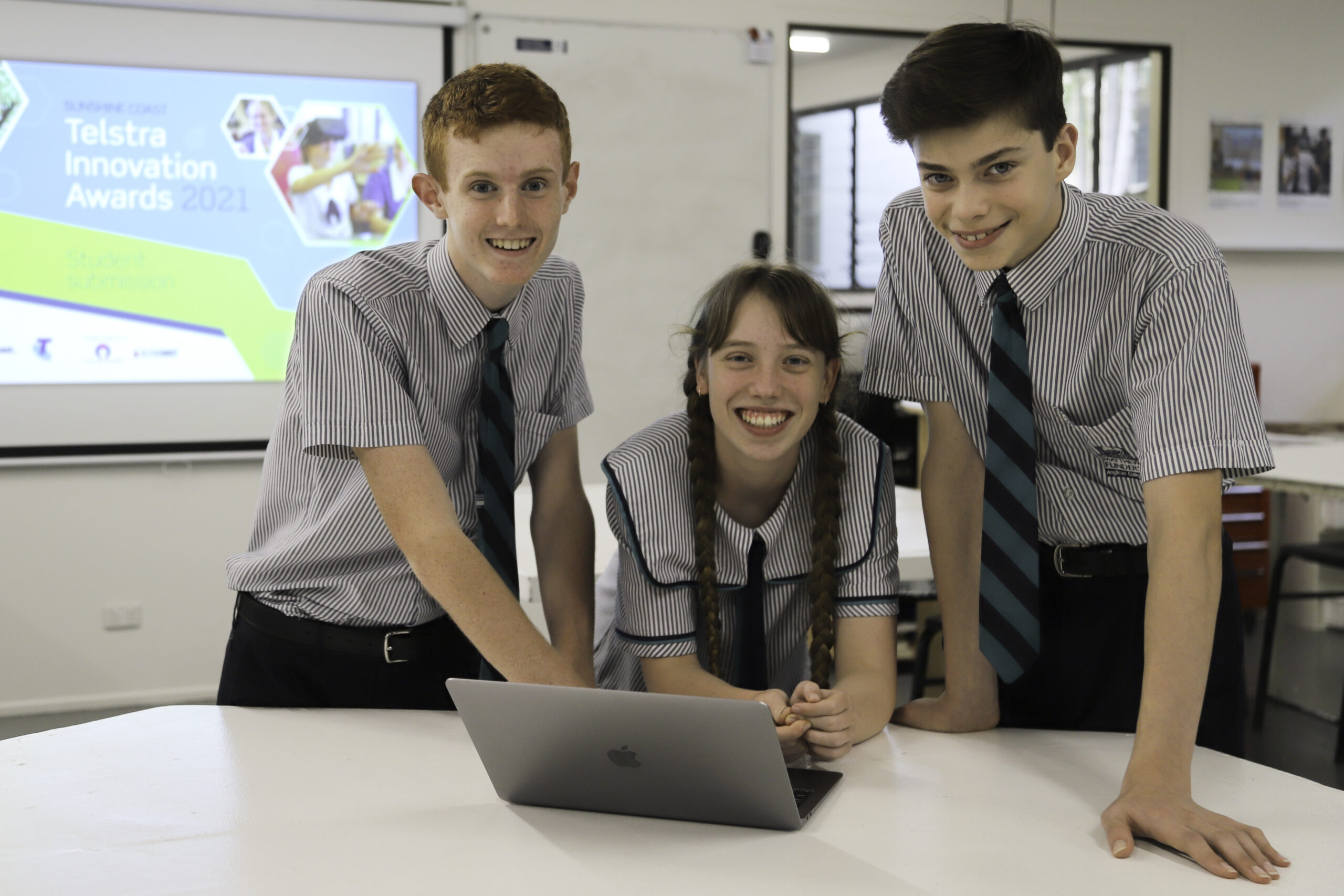Three Year 9 students in the Innovation Club at Matthew Flinders Anglican College have been selected as finalists in the 2021 Sunshine Coast Telstra Innovation Awards.
With their dissolvable cutlery proposal, students Henri, Jessica and Lorenzo aim to solve the significant environmental problem of plastic cutlery used for takeaway meals and eating out.
The Telstra Innovation Awards aims to encourage innovation and creativity, and teach students new skills relevant to industry and critical thinking.
As finalists, the Flinders students have access to four weeks of virtual mentoring sessions with entrepreneurs and industry experts.
On the 23 June, the 12 finalist student teams will present their developed concept in a live ‘pitch’ to the evaluation panel, and the winner will then be announced.
Design Thinking in Education
Mrs Natalle Sutton, Head of Technologies at Matthew Flinders Anglican College said it was exciting for students to be given real-world opportunities to explore new interests and develop their passions.
“Flinders Innovation Club is a new offering as part of the College’s extensive Co-curricular Program,” Mrs Sutton said.
“The Innovation Club aims to give our students ownership over their projects as they learn how to use critical thinking, creativity, problem solving and collaboration throughout the design process,” she said.
“Aside from having a lot of fun together, students are also finding that these skills are important and adaptable to support any subject area.”
The Design Idea
The students’ design is timely as the Australian government prepares to ban the supply of single-use cutlery from September 1 this year.
Plastic utensils are discarded as landfill and are also littered, putting wildlife in danger as animals mistake plastic for food and can choke or develop severe health detriments.
The students’ design proposal is to use a water soluble, biodegradable PVA filament to 3D print cutlery, and other plastic products, as an alternative to single-use plastic utensils.
The printer filament is environmentally friendly, non-toxic and dissolves in water. This means that instead of adding to landfill once it has been used, 3D printed items will dissolve in natural moisture, thus becoming a liquid.
Student Jessica said, “Our design idea is innovative because it does not already exist, and it can be adapted to multiple other plastic products.
Henri said, “It’s exciting that single-use plastics will soon be banned, which means our idea has the potential to be vital to Australian communities and businesses who will need to provide alternate products.”
Benefits to the Environment and Economy
“The World Wide Fund for Nature (WWF) has stated that, “Eating out and getting takeaway often comes with an expensive consequence. In Australia, plastic cutlery isn't easily recycled, and so much ends up in landfill, taking centuries to break down.”
Lorenzo said, “This shows that continued careless cutlery disposal will result in significant risk to the environment both marine and land life.”
Henri said, “One of the challenges now is to determine how to make the product solution more rigid so that the cutlery can be used without bending. This may involve investigating other filaments and industry manufacturing options.
The students are aware that the design will not only benefit the environment but also the economy.
A cleaner environment would save the government billions of dollars in waste management, which could be used for other public services.
Design Thinking at Flinders
The students created their innovative proposal with support from Flinders Design and Technology teachers, Mrs Natalle Sutton and Mr Peter Horton.
Mr Horton said, “We are thrilled that our students are being recognised for their design idea in these major Telstra Innovation awards. This is a very promising start for our first Innovation Club team.”
Mrs Sutton said, “It’s wonderful to see students embrace and experience the adventure of design: to tackle problems and find solutions!”
Did you know...?
- Plastic utensils are discarded as landfill and are also littered, putting wildlife in danger as animals mistake plastic for food and can choke or develop severe health detriments.
- According to the Australian Bureau of Statistics, 2.5 million tonnes of plastic waste was found in landfill in one year with only 9% of it recycled, while 84% was sent to landfill.
- It costs Australia $17 billion to manage waste each year.
- A cleaner environment would save the government billions of dollars in waste management, which could be used for other public services.

